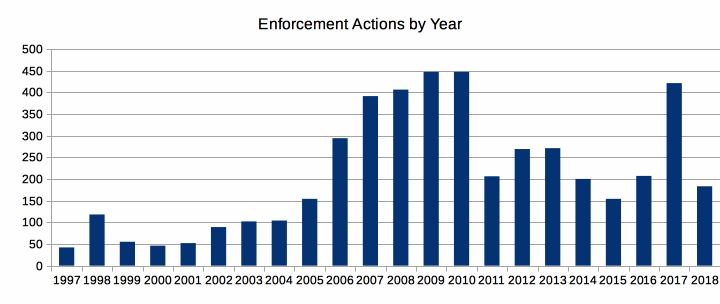Just updated the Enforcement Action Database and the signs are pretty clear: unlicensed broadcasting has slipped down the priority-list for FCC field agents. Actions against AM/FM and shortwave pirate stations last year were at their lowest level since 2005, the last time fewer than 200 were logged.

Tactically, even the agency’s penchant for paperwork seems to have slackened. Continue reading “FCC Steps Down Anti-Pirate Enforcement”
Month: February 2015
Next Steps for Radio Preservation Task Force
Just received a comprehensive update on the work of the Radio Preservation Task Force, an initiative announced last year by the Library of Congress to digitally preserve local radio history. About 100 scholars spent last fall scouring libraries, museums, historical societies, and stations around the country looking for recordings large and small. More than 100,000 were discovered, and that impressed the LoC’s National Recording Preservation Board enough to move on to “phase two,” which (in part) will involve more detailed examination of our finds.
The Task Force is also lining up some specific preservation programs in conjunction with other media preservationists. Continue reading “Next Steps for Radio Preservation Task Force”
FCC Budget Request: Dollars Up, Staff Down
The Federal Communications Commission has submitted its budget request for fiscal year 2016, and on its face it’s pretty vanilla. The agency seeks the authority to spend some $536 million — nearly $80 million more than last year. The tax burden for FCC operations for the average citizen is effectively nil, as the agency funds itself through spectrum auction/license income and other regulatory fees, with any surpluses sent to the U.S. Treasury.
The vast majority of the FCC’s increased ask relates to money it would like to earmark to administer more spectrum auctions (including one to repack the digital TV service to make more spectrum available for wireless broadband), continue the overhaul of its subsidy programs for public telecommunications, and prepare for a reorganization of the FCC’s headquarters. That last one is perhaps the most notable for its direct effect on agency operations, as the FCC leases its space and the contract is coming due. Options include moving FCC HQ in its entirety (a process last done in the late ’90s) or “restacking” the existing office complex to “substantially reduce our square footage and lower our rental expense.” Continue reading “FCC Budget Request: Dollars Up, Staff Down”
AT&T Lightly Chastised for Airwave Piracy
Late last week the Federal Communications Commission released a Notice of Apparent Liability against AT&T for running microwave radio links without the proper licenses. These links are often used as point-to-point backhauls to move data long distances, and sometimes they are used to connect cell nodes in remote locations to the larger network.
The shenanigans first came to light in 2011, when the FCC found an AT&T microwave link in Puerto Rico that was operating on the wrong frequency. The company subsequently conducted a review and found that hundreds of its microwave links were operating outside of licensed parameters and, in some cases, were not licensed at all. AT&T claims these links were part of acquisitions it made from 2009-2012, and in simple terms neglected to file the right paperwork to adequately license them. But the scale of the problem isn’t minor: at least 240 point-to-point microwave licenses in all require either major modifications or minor modifications to be brought into compliance. All have been operating outside license parameters (or without licenses at all) for three to four years. Continue reading “AT&T Lightly Chastised for Airwave Piracy”